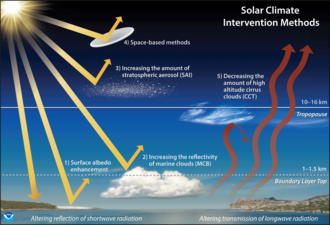
Solar radiation modification (SRM), also known as solar radiation management, or solar geoengineering, refers to a range of approaches to limit global warming by increasing the amount of sunlight (solar radiation) that the atmosphere reflects back to space or by reducing the trapping of outgoing thermal radiation. Among the multiple potential approaches, stratospheric aerosol injection is the most-studied, followed by marine cloud brightening. SRM could be a temporary measure to limit climate-change impacts while greenhouse gas emissions are reduced and carbon dioxide is removed,[1] but would not be a substitute for reducing emissions. SRM is a form of climate engineering.
Multiple authoritative international scientific assessments, based on evidence from climate models and natural analogues, have generally shown that some forms of SRM could reduce global warming and many adverse effects of climate change.[2][3][4] Specifically, controlled stratospheric aerosol injection appears able to greatly moderate most environmental impacts—especially warming—and consequently most ecological, economic, and other impacts of climate change across most regions. However, because warming from greenhouse gases and cooling from SRM would operate differently across latitudes and seasons, a world where global warming would be offset by SRM would have a different climate from one where this warming did not occur in the first place. Furthermore, confidence in the current projections of how SRM would affect regional climate and ecosystems is low.[1]
SRM would pose environmental risks. In addition to its imperfect reduction of climate-change impacts, stratospheric aerosol injection could, for example, slow the recovery of stratospheric ozone. If a significant SRM intervention were to suddenly stop and not be resumed, the cooling would end relatively rapidly, posing serious environmental risks. Some environmental risks remain unknown.
Governing SRM is challenging for multiple reasons, including that several countries would likely be capable of doing it alone.[5] For now, there is no formal international framework designed to regulate SRM, although aspects of existing international law would be applicable. Issues of governance and effectiveness are intertwined, as poorly governed use of SRM might lead to its highly suboptimal implementation.[6] Thus, many questions regarding the acceptable deployment of SRM, or even its research and development, are currently unanswered.
- ^ a b Trisos, Christopher H.; Geden, Oliver; Seneviratne, Sonia I.; Sugiyama, Masahiro; van Aalst, Maarten; Bala, Govindasamy; Mach, Katharine J.; Ginzburg, Veronika; de Coninck, Heleen; Patt, Anthony. "Cross-Working Group Box SRM: Solar Radiation Modification" (PDF). Cambridge, United Kingdom and New York, NY, USA: Cambridge University Press. pp. 221–222. doi:10.1017/9781009325844.004.
In Climate Change 2022: Impacts, Adaptation and Vulnerability [H.-O. Pörtner, D.C. Roberts, M. Tignor, E.S. Poloczanska, K. Mintenbeck, A. Alegría, M. Craig, S. Langsdorf, S. Löschke,V. Möller, A. Okem, B. Rama (eds.)].
- ^ Intergovernmental Panel on Climate Change (IPCC) (6 July 2023). Climate Change 2021 – The Physical Science Basis: Working Group I Contribution to the Sixth Assessment Report of the Intergovernmental Panel on Climate Change (1 ed.). Cambridge University Press. doi:10.1017/9781009157896.006. ISBN 978-1-009-15789-6.
- ^ Cite error: The named reference
:0was invoked but never defined (see the help page). - ^ World Meteorological Organization (WMO) (2022). Scientific Assessment of Ozone Depletion: 2022. Geneva: WMO. ISBN 978-9914-733-99-0.
- ^ Gernot Wagner (2021). Geoengineering: the Gamble.
- ^ Biermann, Frank; Oomen, Jeroen; Gupta, Aarti; Ali, Saleem H.; Conca, Ken; Hajer, Maarten A.; Kashwan, Prakash; Kotzé, Louis J.; Leach, Melissa; Messner, Dirk; Okereke, Chukwumerije; Persson, Åsa; Potočnik, Janez; Schlosberg, David; Scobie, Michelle (2022). "Solar geoengineering: The case for an international non-use agreement". WIREs Climate Change. 13 (3). Bibcode:2022WIRCC..13E.754B. doi:10.1002/wcc.754. ISSN 1757-7780.